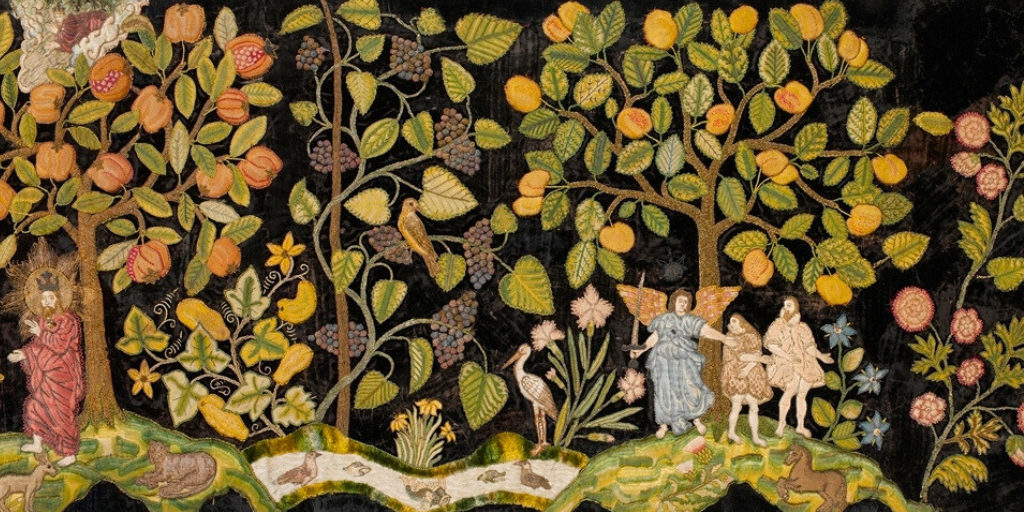
Flávia Ghelardi discusses our need to fight to regain our innocence before God.
Flávia Ghelardi writes from Brazil in English and Portuguese. Vá para a versão em português.
Before the Fall, they felt no shame
In the Creation story, we see that “the man and his wife were both naked, yet they felt no shame” (Genesis 2:25, emphasis mine). However, after the tragedy of original sin, the rebellion of our first parents in not accepting being creatures and wanting to be “other gods,” falling into the trap of the devil and disobeying the Creator, we see this conversation between Adam and God:
The Lord God then called to the man and asked him: Where are you?
He answered, “I heard you in the garden; but I was afraid, because I was naked, so I hid.”
Then God asked: Who told you that you were naked? Have you eaten from the tree of which I had forbidden you to eat? (Genesis 3:9-11, emphasis mine)
What was the consequence of sin that made man afraid of being naked? Before the sin, they were not ashamed; but afterwards, they were afraid and hid from God. This nakedness means much more than simply being unclothed. It is an attitude towards God of total self-denial and trust, of surrender to his loving providence.
Sin has caused human beings to lose that purity and simplicity of being a creature before God, of knowing that they are cared for and loved with infinite love. The fear of being naked represents distrust in God's love and protection, the desire for self-sufficiency, to take control of one's own life without divine interference, the fruits of the disorder caused by sin.

We need to fight to be naked again
So we need to fight to be naked again, to regain that filial trust that our first parents had before God. The first step is to get to know God better, because we can't trust someone we don't know. In order to get to know God better, we need to spend time with him, talk to him and, above all, try to listen to what he says to us, through circumstances, events in our lives, the people we meet, nature, all created things. In short, everything can be a sign of God's love for us.
Meditative prayer is fundamental to this greater knowledge of God. Set aside a few minutes a day, choose a text from a spiritual book or the Bible, or even an event in your life, and ask yourself: what does God mean by this? What do I say to myself? What do I say to God? Over time, this practice will open our eyes, our minds and our hearts to perceive the love and care of God the Father in our lives.
The saints learned this path of total and unconditional surrender to divine providence. They knew that they were loved and cherished, even in their misery, and so, with effort and the help of grace, they were able to respond to this divine love, with attitudes of struggle against imperfections in order to one day eternally enjoy the presence of the Father.
Saint Thérèse of the Child Jesus said:
I expect everything from the Good Lord, as a little child expects everything from its father. My path is the path of spiritual childhood, the path of trust and absolute surrender.
Let's ask for the help of Mary Most Holy, the person who trusted and loved God the most, so that little by little we can regain that attitude of obedient and faithful children, who trust and give themselves completely to the Father, because they know that they are loved and that everything the Father provides and allows is for their good, their holiness and to earn their place in the eternal happiness of Heaven.

Voltar a Estar Nus
No relato da Criação, vemos que “o homem e a mulher estavam nus e não se envergonhavam” (Gn 2,25). Porém, após a tragédia do pecado original, da rebeldia dos nossos primeiros pais em não aceitarem serem criaturas e quererem ser “outros deuses”, caindo na armadilha do demônio e desobedecendo ao Criador, ouvimos Adão dizer: “Ouvi o barulho dos vossos passos no jardim; tive medo, porque estou nu; e ocultei-me” (Gn 3,10). E Deus responde: “Quem te revelou que estavas nu? Terias tu porventura comido do fruto da árvore que eu te havia proibido de comer?” (Gn 3,11)
Qual foi essa consequência do pecado que fez com que o homem tivesse medo por estar nu? Antes do pecado, não se envergonhavam; mas depois, tiveram medo e se esconderam de Deus... Essa nudez significa muito mais do que simplesmente estar sem roupa. É uma atitude perante Deus de total despojamento e de confiança, de entrega em sua amorosa providencia.

O pecado fez com que o ser humano perdesse essa pureza e singeleza de ser criatura diante de Deus, de saber que é cuidada e amada com amor infinito. O medo por estar nu representa a desconfiança no amor e proteção de Deus, o desejo de autossuficiência, de assumir o controle da própria vida sem a interferência divina, frutos desordem causada pelo pecado.
Então, nós precisamos lutar para voltar a estar nus, para retomar aquela confiança filial que nossos primeiros pais tinham perante Deus. O primeiro passo é buscar conhecer melhor a Deus, pois não é possível confiar em quem não conhecemos... Para conhecer melhor, é preciso passar tempo com Deus, dialogar com Ele e principalmente buscar ouvir o que Ele nos diz, através das circunstâncias, dos acontecimentos em nossa vida, das pessoas com quem nos encontramos, da natureza, das coisas... Enfim, tudo pode ser um sinal do amor de Deus para conosco.
A oração meditativa é fundamental para esse maior conhecimento de Deus. Reservar alguns minutos por dia, escolher um texto de um livro espiritual ou da Bíblia, ou até um acontecimento da nossa vida e perguntar: o que Deus quer me dizer com isso? O que eu digo a mim mesmo? O que eu respondo a Deus? Essa prática, com o tempo, vai abrindo nossos olhos, nossa mente e nosso coração para perceber o amor e o cuidado de Deus Pai em nossa vida.
Os santos aprenderam esse caminho de entrega total e incondicional à divina providência. Sabiam que eram amados e queridos, mesmo em sua miséria, e assim, com esforço e ajuda da graça, conseguiram responder a esse amor divino, com atitudes de luta contra as imperfeições para um dia desfrutarem eternamente da presença do Pai.
Santa Terezinha do Menino Jesus disse: “Espero tudo do Bom Deus, como uma criancinha espera tudo de seu pai. Meu caminho é o caminho da infância espiritual, o caminho da confiança e da entrega absoluta” (Santa Terezinha do Menino Jesus)

Peçamos a ajuda de Maria Santíssima, a pessoa que mais confiou e amou a Deus, para que aos poucos possamos reconquistar essa atitude de filhos obedientes e fiéis, que confiam e se entregam ao Pai totalmente, pois sabem que são amados e que tudo o que o Pai provê e permite é para o seu bem, a sua santidade e para conquistar seu lugar na felicidade eterna do Céu.
Share your thoughts with the Catholic Mom community! You'll find the comment box below the author's bio and list of recommended articles.
Copyright 2024 Flávia Ghelardi
Images: Metropolitan Museum of Art, CC0, via Wikimedia Commons
About the Author

Flávia Ghelardi
Flávia Ghelardi is the mom of four, a former lawyer already "promoted" to full time mom. Flávia published her first book FORTALECENDO SUA FAMÍLIA and is a member of Schoenstatt´s Apostolic Movement. Flávia loves to speak about motherhood and the important role of women, as desired by God, for our society. She blogs at www.fortalecendosuafamilia.blogspot.com.


.png?width=1806&height=731&name=CatholicMom_hcfm_logo1_pos_871c_2728c%20(002).png)
Comments